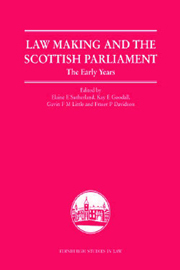Book contents
- Frontmatter
- Contents
- Preface
- List of Contributors
- Table of Cases
- Table of Westminster Statutes
- Table of Scottish Parliament Statutes
- Table of Westminster Statutory Instruments
- Table of Scottish Statutory Instruments
- THE SCOTTISH PARLIAMENT – ITS GENESIS AND OPERATION
- RIGHTS AND SOCIETY
- PUBLIC ADMINISTRATION AND SERVICES
- 7 Local Government
- 8 Housing
- 9 Education: Could Do Better
- JUSTICE AND LEGAL SYSTEM
- ECONOMY AND ENVIRONMENT
- Index
9 - Education: Could Do Better
from PUBLIC ADMINISTRATION AND SERVICES
Published online by Cambridge University Press: 05 September 2013
- Frontmatter
- Contents
- Preface
- List of Contributors
- Table of Cases
- Table of Westminster Statutes
- Table of Scottish Parliament Statutes
- Table of Westminster Statutory Instruments
- Table of Scottish Statutory Instruments
- THE SCOTTISH PARLIAMENT – ITS GENESIS AND OPERATION
- RIGHTS AND SOCIETY
- PUBLIC ADMINISTRATION AND SERVICES
- 7 Local Government
- 8 Housing
- 9 Education: Could Do Better
- JUSTICE AND LEGAL SYSTEM
- ECONOMY AND ENVIRONMENT
- Index
Summary
The Scottish Parliament passed no less than fourteen education statutes between the beginning of 2000 and the end of 2009. This is hardly surprising given the importance of education to the future of Scottish society and the proud independent tradition of education in Scotland. The Parliament has been keen to make a mark on the international stage in recognition of children's rights. Aspirations for the quality of Scottish education are clear. Under previous Westminster administrations, parents were considered the best guardians of education for their children. This administration has not agreed. Parents are to be interested and involved, but education authorities are to exercise power, under the guidance of the Scottish Ministers. Maintaining the quality of education takes money. The education budget forms a significant part of the expenditure of Scottish local authorities. This was recognised in 2007 in a concordat between the Scottish Government and the Convention of Scottish Local Authorities (COSLA) in which the government gave certain commitments to authorities in relation to funding and authorities undertook to do what was required to deliver various key policies and programmes, including certain commitments in the field of education. The recognition that funding is key to implementation of policy has been apparent in the field of further and higher education as well as school education.
- Type
- Chapter
- Information
- Law Making and the Scottish ParliamentThe Early Years, pp. 157 - 180Publisher: Edinburgh University PressPrint publication year: 2011



